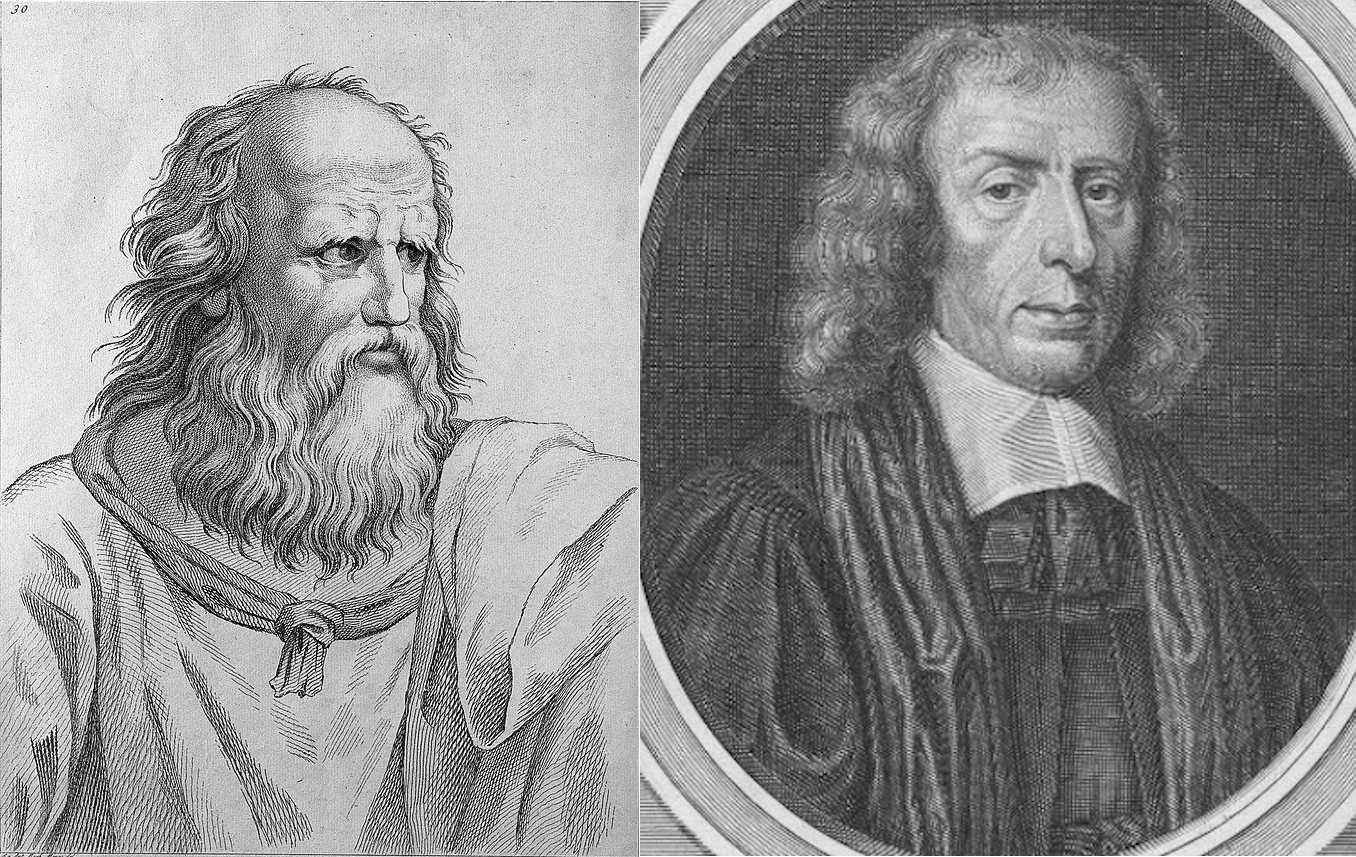
Submitted by Gregg Baldwin on Tue, 12/01/2021 - 14:39
The second seminar in the Greek Dialogues Online series takes the form of a discussion between Professor Douglas Hedley, Director of the Cambridge Centre for the Study of Platonism, and Dr. Christian Hengstermann of the University of Wuppertal. The focus is the influence of Plato on those works of Henry More which were translated into Latin. More was a Cambridge scholar in the seventeenth century and a key figure in the group known as The Cambridge Platonists. In this article, we present the context for what promises to be a fascinating seminar.
"… the most noble and effectual engine to fetch up a man's mind to true virtue and holinesse, next to the bible, that is extant in the World."
(Alazonomastix Philalethes, (Henry More), The Second Lash of Alazonomatrix…)
Writing under the pseudonym Alazonomastix Philalethes, Henry More penned these words to describe the profound nature of Platonic philosophy which was influential in More's thinking and writing. A devout Christian and theologian, More was engaged in attempts to resist a growing atheism which seemed to many to be prevalent in the seventeenth century.
Henry More was born in Grantham, a market town in the English county of Lincolnshire to Calvanist parents in 1614. Educated at King's School in Grantham and then Eton, he entered Christ's College in Cambridge University in 1631 and soon thereafter became a lifelong Fellow of the college.
Whilst at Cambridge, More became acquainted with like-minded scholars including Ralph Cudworth, Benjamin Whichcote, Peter Sterry, John Smith, Nathaniel Culverwell, and John Worthington. They shared similar religious and moral beliefs and all devoted time and energy to defending faith, the existence of God and promoting a code of Christian ethics. In support of these efforts, they drew heavily on, and were great admirers of, Plato. And although they became referred to as "The Cambridge Platonists," they did not restrict themselves to that one strand of philosophical influence, drawing also on Plotinus, Aristotle, Stoicism, and the Renaissance Humanists.
They were also interested in and informed by new developments of the time, as described in the Stanford Encyclopedia of Philosophy: "… they were also very much abreast of new developments in philosophy and science – with Descartes, Hobbes and Spinoza as well as Bacon, Boyle and the Royal Society. Smith, Culverwell, Cudworth and More were among the first Englishmen to read Descartes. Both More and Cudworth were fellows of the Royal Society. The framework within which they read and understood ancient and modern philosophy was that of the ‘perennial philosophy’ (philosophia perennis) adopted by Italian Renaissance philosophers such as Marsilio Ficino, and Agostino Steucho, but also employed by Gottfried Wilhelm Leibniz. They also emphatically repudiated the scholasticism that prevailed in academic philosophy and took a lively interest in the developments that brought about the scientific revolution. They therefore form part of the philosophical revolution of the seventeenth century, especially since they sought an alternative philosophical foundation to Aristotelianism which was waning fast in the face of challenges from scepticism and competing alternative philosophies, notably those of Hobbes and Descartes."
To the extent that they were willing to accommodate emergent philosophies and science and sought to blend them with religious beliefs, they were dualists. For the Platonists, faith and moral principle could co-exist with reason and truth and people possessed independence of mind and free will. They believed in the primacy of mind over matter and the senses and "… accepted post-Galilean science…" and propounded an atomistic theory of matter.
More was the most prolific of the Platonists and to the fore in contemporary philosophical debate. He corresponded with Descartes, eventually coming to criticise Cartesianism, and also took issue with Hobbs and Spinoza. He wrote on a wide range of subjects within philosophy and religion and also touched on modern science proposing, with the other Platonists, an atomistic theory of matter and proposing that space is infinite (and analagous with God.) His output included poetry as well as prose and he attempted to make his work accessible through the use of different genres such as his Philosophical Poems and Divine Dialogues.
From 1672, More translated some of his works into Latin, in part to make them more accessible internationally. His magisterial Opera Philosophica of 1679, now being edited and translated into English on the AHRC-funded project Cambridge Platonism at the Origins of the Enlightenment, contains some of his most seminal writings, including his influential critiques of Baruch de Spinoza, Jacob Boehme and Isaac de Luria.
More’s epistolary treatise Philosophiae Teutonicae Censura provides a critical, albeit sympathetic, account of the eponymous German mystic’s riveting vision of the cosmic drama of divine being and becoming. Written in 1670 at the behest of a friend (probably his “heroine pupil” Anne Conway), the Censura deals both with the person and the work of the famous Silesian shoemaker whom its author, despite the metaphysical errors of his visions, views as a pious Christian of great imaginative power. More’s answers to the addressee’s five questions or “enquiries” amount to a Neoplatonic reimagining of Boehme’s visionary theological Cosmology.
The legacy of the Cambridge Platonists is, today, being preserved and expanded by the Cambridge Centre for the Study of Platonism (CCSP), a major research centre for the interdisciplinary study of Platonism. The centre functions as a community of researchers concerned with the legacy of Platonism, and brings some of the great scholars of Platonism to Cambridge to lecture on their work. The Centre actively encourages graduate students and postdoctoral researchers working on the Platonic tradition in any period. The current Director of the Centre is Professor Douglas Hedley, who has been in post since 2017.
For more on The Cambridge Platonists and their works visit The Cambridge Platonism Sourcebook.
For details on how to access this event, click here.

